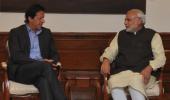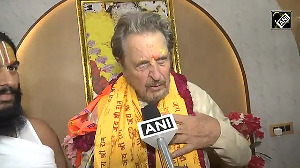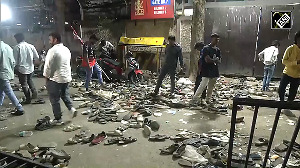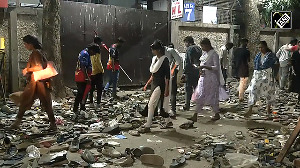'Nawaz Sharif asked: "What if I invited him and he declined?"'
'I said I will check.'
'Vajpayee liked the idea. He said I should see him on my return.'
Shekhar Gupta reveals how Sharif wanted to make peace, but was tripped by the army and notes the lessons it has for Imran Khan.
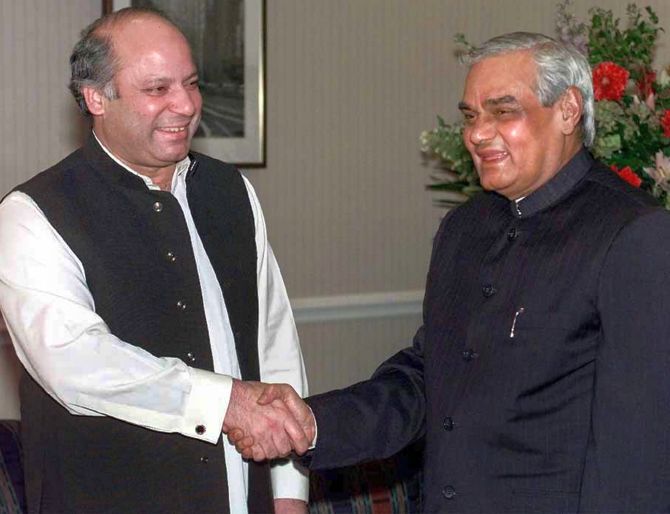
As Imran Khan took over as prime minister of Pakistan -- even as the 30th anniversary of General Zia-ul Haq's death is being observed -- it should be ideal for me to tell this still mostly untold story of a dramatic attempt at peace-making ever by the elected leaders of our two countries.
One of the two leaders it involves passed away on August 16.
The other is incarcerated in a brutal Rawalpindi prison.
Another part player in this saga is this writer. This column, therefore, is also in the nature of a confession.
Mian Nawaz Sharif won his second term in 1997. Shortly after, the Atal Bihari Vajpayee-led National Democratic Alliance took charge in India.
India-Pakistan relations went into deep freeze with Pokhran-2 and Pakistan's tit-for-tat in Chagai, in an ironical nuclear jugalbandi.
By the last quarter of 1998, however, impatience was evident on both sides.
Both leaders wanted a thaw but there was too much mutual distrust within their 'systems'.
Even the suggestion of a Delhi-Lahore bus service was entangled in bureaucratic quibbling.
It was then, in early winter, that a letter from Pakistan arrived in my mail.
Postmarks showed that the envelope, marked 'from the prime minister of Pakistan', had been in transit for several weeks.
It also hadn't travelled well, which was understandable. It had possibly been steamed open and re-sealed by many competing 'agencies' which are unlikely to have seen a letter from a prime minister of Pakistan in ordinary mail before.
It was harmless: Just a warm, if belated, response to a note from me months earlier asking for an interview.
I called back Nawaz Sharif and asked if I could visit Pakistan for the interview. There was some banter.
I asked what was the point of interviews if our prime ministers could not get anything moving.
Forget big things, I said, you people can't even get that bus moving.
Nawaz Sharif muttered the usual complaints with hidebound diplomats.
I said, still in that light-hearted exchange in Punjabi: "Why don't you announce the bus in the interview and invite our prime minister to Pakistan on the first bus?"
Nawaz Sharif liked that idea. But he asked: "What if I invited him and he declined? It will look really bad."
I said I will check.
Which I did. Vajpayee too liked the idea. But he said I should see him on my return and not publish it until then.
In the interview at his Lahore home, often interrupted by cricket when Sachin Tendulkar battled back pain to play his brilliant innings that almost won the Chennai Test against Pakistan, Nawaz Sharif kept his promise.
Start the bus, he said, and invited Vajpayee to be on it. He will ensure a welcome, he said, that history will remember.
Vajpayee asked me to hold it for a day. He wanted the interview to be published on the day he was landing early morning in Lucknow.
He wanted to ensure a reporter ask him a question on Nawaz Sharif's invitation. Which, he said, he would publicly accept before the ministry of external affairs came up with its usual doubts.
The rest is well-recorded history.
The visit happened soon after too much drama. There were some discordant notes, particularly with then Pakistan army chief General Pervez Musharraf refusing to salute him in welcome.
Vajpayee walked up the steps of the Minar-e-Pakistan to say a stable and prosperous Pakistan was in India's best interests.
History, it seemed, was being made. It was heady to have been part of it.
Somebody today might say that the interview was 'fixed'. If so, it was to good purpose. It was also a terrific newsbreak.
The story doesn't end yet.
While the two prime ministers were having their peace fest, unknown to both of them, the Pakistan army was infiltrating miles across a wide frontier in Kargil and digging in.
By mid-May, the first clashes took place.

On May 26, India flung in air power. Two MiGs were lost to shoulder-fired missiles on the next day. A third, a lumbering Canberra on photo-reconnaissance took a missile hit on one of its engines, but was fortunately nursed back to base safely.
Nobody was prepared for this.
The phone rang in my hotel room in Mumbai early, 6.30 am, and the caller said the prime minister wanted to speak to me.
He sounded concerned. "Yeh kya kar raha hai mitr aap ka? (What is this friend of yours doing?)." he asked.
He said everybody was taken by surprise, how can mere mujahideen have missiles, and all this while Pakistan's army chief was in China.
So what the hell is going on, can you ask your friend? I left a message at the usual number in Islamabad.
The call came later that night. Nawaz Sharif sounded as perplexed as Vajpayee.
"You can tell him I won't betray him. I was told yesterday there were some routine clashes on the LoC and today they reported 'air violations'," he said.
"I am also surprised," he said, adding he would want to engage with Vajpayee.
Vajpayee and Brajesh Mishra called me on my return.
They said 'our people' had intercepted some phone conversations between General Musharraf and his deputy, confirming that Kargil was purely a military operation.
Would I, therefore, go to Islamabad again on the pretext of an interview and tell Nawaz Sharif about the tapes.
By this time, I was chastened. I can't, and I shouldn't, I politely told them.
The earlier interview was a genuine scoop and the bus ride a collateral benefit. But this was going too far from journalism.
They understood. They asked another editor, a former one, to do this.
R K Mishra, then with the Observer Research Foundation, made several trips to Islamabad. He even delivered to Nawaz Sharif the tapes of those intercepted conversations as evidence.
My story, or extra-journalistic adventure, had ended.
Vajpayee led India to victory in Kargil. He turned the betrayal to his advantage and emerged with unhandled stature.
Sharif, who was forced to sue for peace through President Bill Clinton, wasn't so fortunate.
This led to a breakdown in his relations with his army, a coup within months, imprisonment and a long exile.
With this ended the most determined effort by an elected Pakistani leader to take foreign and strategic, especially India, policies from the army.
It is unlikely that such an opportunity would arise again.
Very improbable to see Imran Khan gathering the courage to challenge his army-Inter-Services Intelligence establishment for real power.
There are many lessons here for Pakistan's new prime minister.
First, trying to make peace with India is risky, and definitely suicidal to do it over the generals' head.
Second, that no elected prime minister in Pakistan has been allowed by the same establishment to complete a full term yet.
And third, that every elected prime minister has ended up being exiled, jailed, killed, or, as in the case of Benazir Bhutto, all three.
Imran has taken risks in life: In cricket, relationships, marriage and politics.
But the basic power equation in his country hasn't changed.
If anything, it has reversed whatever democratic easing may have taken place in the past decade.
If at all he tries to make peace, it will be because his army told him to do so, not in its defiance.
And even if new beginnings were to be made, I will never again be drawn in!
It's tempting, but tricky. Even if it might be a fine story to tell later.
There are four reasons I decided to tell it now: Vajpayee's departure, Nawaz Sharif's imprisonment, Imran's swearing-in and, most important, that 20 years have passed since.
By Special Arrangement with The Print

